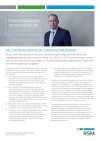Recently the government has announced a new measure that allows for the possibility to carry back an expected tax loss for 2020 by creating a ‘corona reserve’ in 2019. This is an interesting new measure although it is subject to certain restrictions.
Corona reserve
Based on the decree of May 6th, 2020 only entrepreneurs that are subject to Dutch corporate income tax are allowed to create a corona reserve. In addition, the following five conditions have to be satisfied:
- There has to be an expected ‘corona related tax loss’ in the financial year 2020. This would for instance be the case if a loss is expected due to a decrease in turnover as a result of the measures taken by the Dutch government in light of COVID-19.
- The expected corona related tax loss cannot exceed the total expected tax loss for the financial year 2020. It is therefore not possible to create a corona reserve if a profit is expected in 2020. The taxpayer is responsible for estimating the expected corona related loss.
- The addition to the corona reserve in the financial year 2019 is limited to the taxable profit that the taxpayer would have realized without creating the reserve.
- The reserve has to be released in full in the financial year 2020. When the reserve is attributed to the profit in 2020, the same regulations on how to determine the profit as in book year 2019 need to apply for book year 2020.
- The addition to the corona reserve in the financial year 2019 and the release of the reserve in the financial year 2020 have to be included under the other fiscal reserves in the respective corporate income tax returns.
Corona provision
If it not possible to create a corona reserve because one or more of these conditions are not satisfied it is advisable to check whether based on current legislation it is possible to create a corona provision in the financial year 2019. The main advantage of creating such provision is that it allows for the possibility to request an additional corporate income tax assessment for the financial year 2019 based on a lower taxable amount. This would result in a refund of corporate income tax already paid with respect to the financial year 2019. In addition, creating a corona provision could potentially result in an additional carry-back to the financial year 2018 of a tax loss incurred in the financial year 2019.
Hereafter we summarize the rules that govern the possibility to form a provision for the impact of the Covid-19 crisis.
The Dutch supreme court ruled that the creation of a provision for Dutch tax purposes is allowed when the future expenses for which the provision is created find their origin in facts and circumstances that occurred prior to financial year end (origin criterion) and can otherwise also be accounted for in that financial year (sound business practice criterion) whereby a reasonable degree of certainty exists that the expenses will be incurred in the future (geredekans-criterium).
Origin criterion
Because the first outbreak of the Corona virus occurred in December 2019 it could be argued that there are facts and circumstances that have occurred prior to the end of the financial year 2019 based on which the origin criterion would be satisfied.
Sound business practice criterion
The requirement that expenses need to be allocated to the period prior to year end is based on the principle that expenses should be matched with the period during which the income is also reported. That means that this requirement is not satisfied if a strong relation exists between (future) expenses and the future revenue (in a following year). After all the provision is not intended to allow for a deduction of expenses that relate to future operations in an earlier year.
Nevertheless, if no or less revenue is expected as a result of COVID-19, future expenses can no longer be accounted for in the following year. In such cases it is possible to take the position that the expenses, via the provision, can be accounted for in 2019, if the other criteria are met. For example, a loss arising from a contract.
Reasonable chance criterion
Whether the condition that there is a reasonable chance that the expenses will be incurred is satisfied will need to be assessed on a case by case basis. However, for obligations that follow from contracts this condition should generally be satisfied.
Furthermore, in respect of this condition, the position can be taken to consider the developments in terms of the knowledge of the corona virus that took place in 2020 when addressing this question.
Conclusion
Depending on the underlying facts and circumstances there are possibilities to create a provision. For entrepreneurs that do not make use of the corona reserve, creation of a provision could offer a solution and provide you with a direct liquidity advantage.
More information?
For more detailed information and questions please contact your trusted RSM advisor or send an email to [email protected].
Download 'The corona reserve and corona provision' in pdf

